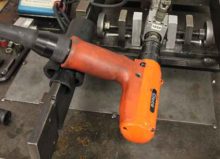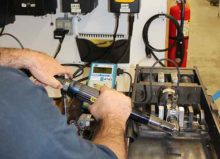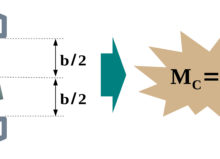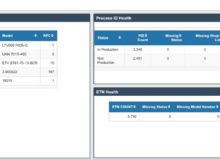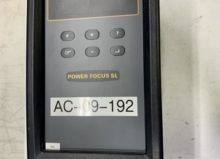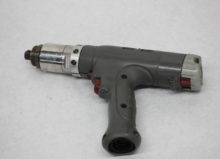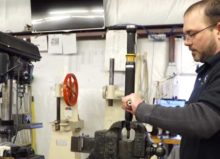Selecting an Electric Torque Wrench for Automotive Assembly Applications
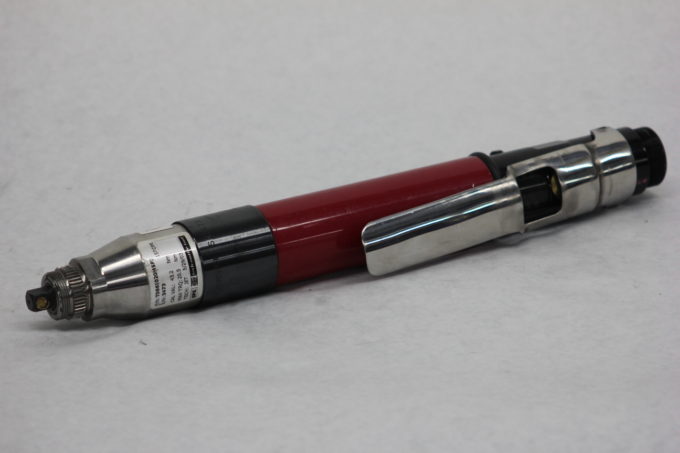
In automotive assembly applications, having the right torque wrench on hand is not just a matter of efficiency but of quality and safety. The right wrench will ensure that each bolt is tightened to the exact specifications required, reducing the risk of under- or over-tightening.
There are many types of torque wrenches, from manual click, beam, and dial to electronic. Electric wrenches offer significant advantages in precision, ease of use, and consistency compared to manual torque wrenches. However, despite these advantages, choosing the wrong electric wrench will still lead to inefficiencies and quality issues.
In this article, we’ll cover which factors to consider when selecting electric torque wrenches for your plant.
Ergonomics
First, a well-designed torque wrench should have a balanced weight distribution to minimize user fatigue, especially in tasks requiring extended use. When searching for torque wrenches, look for models described as lightweight. The handle should also be comfortable, with a design that allows for a secure grip. Features like simple control interfaces and clear displays can also add value and make the tools more user-friendly for your technicians.
Lastly, prolonged exposure to vibration and noise can lead to user discomfort, so the torque wrenches you choose should ideally have features to dampen vibration.
Torque Range
As you already know, different automotive assembly tasks require specific torque values, so you need a wrench that can cover the range required for your application(s). The accuracy of the torque wrench within its specific range is also vital. If a wrench cannot consistently provide the correct torque within its range, it can lead to under- or over-tightening.
If you have multiple assembly applications, consider selecting a wrench with a wider torque range, as this will reduce the need to purchase multiple tools with different fastening requirements.
Size & Design
The size and design of an electric torque wrench are also crucial factors that impact usability. For example, automotive assembly applications often require working in tight spaces, so it’s crucial to have a compact wrench that can easily access narrow or confined areas. As mentioned earlier, lightweight, ergonomic models tend to be better, as heavier torque wrenches or wrenches with poor grip will increase the risk of operator fatigue.
Here is a breakdown of common electric torque wrench designs and their uses:
- Straight: This is the most common form, resembling a traditional wrench. It’s extremely versatile and can be used in many situations, but it may not be the best choice when working in very tight spaces.
- Angle Head: In this design configuration, the wrench’s head is set at an angle to the handle, which can be beneficial for reaching bolts in awkward locations.
- Pistol Grip: This type of wrench looks similar to a drill, as it has a handle that’s perpendicular to the wrench head. This design is often more ergonomic and can be easier to use in certain situations, particularly where a straight line of force is needed.
- Inline: In this design, the body of the wrench is in line with the bolt, offering a direct approach to the bolt axis. An inline wrench is particularly useful for accessing bolts in deep recesses or in applications where working in a straight line is necessary.
- Adjustable Head: Some electric torque wrench models allow the head to be moved at different angles, which provides greater application flexibility.
- Interchangeable Heads: With this wrench, you can change the head (open-end versus ratchet, etc.) based on the task being performed.
Fastener Versatility
It can also be cost-effective to choose an electric torque wrench that can be used on various fastener types, including hex bolts, socket head cap screws, and flange bolts, instead of buying different tools for each fastener type. As mentioned in the previous section, some electric torque wrench models have interchangeable sockets or adapters and adjustable torque settings, making it possible to use the same tool with multiple fastener types.
Data Recording Capabilities
As a manufacturer, it’s vital that you select a tool with real-time data recording capabilities. Data recording allows you to document torque values applied to each fastener, ensuring every component is assembled correctly and meets the specified standards. This capability also allows you to provide a traceable history of the assembly process, which is important for identifying and resolving potential issues that arise during production and ensuring compliance with strict industry standards.
Battery Life
Battery life is another important consideration—you already know that the longer the tool can be used, the better. Frequent stops to recharge or change batteries can lead to downtime. Reliable battery life allows for more predictable planning of assembly processes.
Look for electric torque wrenches that feature a longer battery life and consume less power. It’s important to note that batteries that last longer typically have a longer overall lifespan, so they don’t need to be replaced as often.
Additionally, the battery is often a significant contributor to the weight and balance of a wrench, so tools that are designed with battery efficiency tend to be lighter and better balanced, improving ergonomics/ease of use.
Total Cost of Ownership
Next, don’t focus too much on the initial purchase price. Instead, evaluate the total cost of ownership, which not only includes the purchase cost but also operational, maintenance, and disposal expenses.
While selecting a cheap tool can save you money upfront, it doesn’t necessarily mean it will save you money in the long run. You need to consider the costs associated with battery life, including how often the battery will need to be replaced and the energy costs of charging the batteries. You also need to consider the amount of power the wrench consumes during operation, which impacts overall energy costs.
You must also consider the costs associated with routine maintenance/calibration, repair expenses, and disposal and replacement fees once the tool reaches the end of its expected lifespan. A longer tool lifespan will reduce the frequency of replacement costs.
There are also some indirect costs you may not consider initially. What happens if you purchase an unreliable tool and it unexpectedly stops working? Production is then impacted because the tool is now out of service for maintenance, repair, or replacement. Additionally, if the tool does not display accurate torque, you may incur potential fines or rework costs due to noncompliance with industry standards.
Brand
The manufacturer/brand you choose does matter, especially in automotive assembly applications where reliability, precision, and durability are necessities.
Look for brands that integrate the latest technologies into their tools, focus on ergonomic designs, and are known for manufacturing durable and reliable tools. It’s also important to consider each brand’s customer support capabilities, warranty policies, and repair or part replacement availability.
At Encore Systems, we recommend brands like Atlas Copco, STANLEY®, and Cleco/Cooper.
Atlas Copco has a reputation for innovation, product quality, and reliability. This brand constantly manufactures products incorporating new technologies and offers an extensive support and service network.
STANLEY® is known for providing highly versatile products and competitive pricing. STANLEY® also has an extensive support network, including certified repair centers, and provides comprehensive technical documents.
Lastly, Cleco/Cooper specializes in assembly tools and is respected for its commitment to manufacturing highly accurate, durable, and ergonomic torque tools. Cleco/Cooper also has a well-established customer support network and provides plenty of resources and training videos to its customers.
Purchase an Electric Torque Wrench From Encore Systems
Encore Systems is proud to be a trusted provider of ISO-certified DC torque tool repair and calibration services. We serve manufacturers in all sectors across the United States, Mexico, and Canada. Some of our customers include OEMs like Ford, Honda, Toyota, and Mercedes-Benz.
In addition to our repair and maintenance capabilities, we sell refurbished electric torque wrenches and provide customized tool management solutions.
Please click here to browse our inventory of refurbished torque tools or contact us today to request services—we provide free part evaluations and emergency repairs and can service all top brands.



